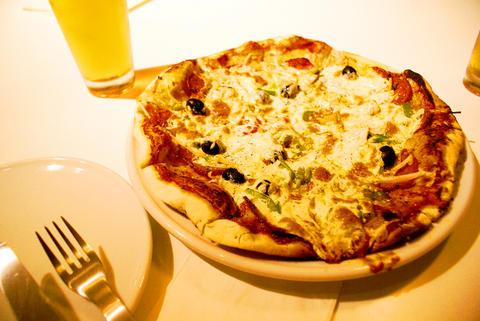Woolloomooloo means "bountiful harvest," or, as Jimmy Yang (楊啟鉉), the laid back proprietor and chef of the cafe bearing the Aboriginal name, says, "Dude, there is a lot of fish here." It's also the name of a recently gentrified area of Sydney, Australia, that features European-style cafes and is the inspiration for the architect's labor of love.
"All architects dream of opening a cafe," said Yang, who lived in Melbourne for 20 years.
Opened six months ago, the cafe is situated on a quiet street close to Taipei Songshan Airport, and a 10-minute walk from the Zhongshan Junior High School (中山國中) MRT station.

PHOTO: NOAH BUCHAN, TAIPEI TIMES
Woolloomooloo has a modern, chic decor. The exposed cement floors and whitewashed walls and wooden tables and shelves are complimented by soft track lighting. Two-thirds of the eating area is given over to two large tables - one square, the other rectangular. Yang has spaced the chairs far enough apart that different parties can dine at the same table without fear of disturbance. On weekends, however, the two tables are often packed with larger parties sipping wine and eating cheese and salami (NT$150 for two up to NT$450 for six).
The other third consists of five two-seater tables and is separated by a standup bar with stools. Large picture windows provide soft natural lighting during the day and glimpses of the tree-lined street.
Apart from the atmosphere, regulars come to sample the limited but mouth-watering menu of drinks and food. There is an emphasis on coffee (NT$100 to NT$150) - the beans are flown in weekly by Tobys Estate, an Australian coffee company - as Yang thinks it's difficult to find a good cup of coffee in Taipei.
"Too often restaurants serve coffee that isn't fresh because it's shipped rather than flown to Taiwan," he said.
Yang stocks a wide range of Australian bottled beers including the popular Crown (NT$200) and a selection of ales by Coopers (NT$150). The wine list is Australian and ranges from NT$1,300 to NT$3,400 per bottle. Glasses of house wine are a bit pricey at NT$230 for the white and NT$250 for the red.
Where he can, Yang makes all his dishes from scratch. The dough used in the pizza is made the day before and is rolled and topped at the time of ordering. His pasta dishes (NT$180 to NT$260) are all made using fresh pasta ordered from a local company, who makes all their pasta using organic semolina flour imported from Australia.
As for the food, the pizza with salami (NT$450) is one of the best in town. It came loaded with mozzarella, fresh slivers of green peppers and onions, whole olives (with the pits) and generous portions of salami. The sauce was rich with tomatoes and spices and the thin crust was cooked so that it was crispy outside.

On April 26, The Lancet published a letter from two doctors at Taichung-based China Medical University Hospital (CMUH) warning that “Taiwan’s Health Care System is on the Brink of Collapse.” The authors said that “Years of policy inaction and mismanagement of resources have led to the National Health Insurance system operating under unsustainable conditions.” The pushback was immediate. Errors in the paper were quickly identified and publicized, to discredit the authors (the hospital apologized). CNA reported that CMUH said the letter described Taiwan in 2021 as having 62 nurses per 10,000 people, when the correct number was 78 nurses per 10,000

As we live longer, our risk of cognitive impairment is increasing. How can we delay the onset of symptoms? Do we have to give up every indulgence or can small changes make a difference? We asked neurologists for tips on how to keep our brains healthy for life. TAKE CARE OF YOUR HEALTH “All of the sensible things that apply to bodily health apply to brain health,” says Suzanne O’Sullivan, a consultant in neurology at the National Hospital for Neurology and Neurosurgery in London, and the author of The Age of Diagnosis. “When you’re 20, you can get away with absolute

May 5 to May 11 What started out as friction between Taiwanese students at Taichung First High School and a Japanese head cook escalated dramatically over the first two weeks of May 1927. It began on April 30 when the cook’s wife knew that lotus starch used in that night’s dinner had rat feces in it, but failed to inform staff until the meal was already prepared. The students believed that her silence was intentional, and filed a complaint. The school’s Japanese administrators sided with the cook’s family, dismissing the students as troublemakers and clamping down on their freedoms — with

As Donald Trump’s executive order in March led to the shuttering of Voice of America (VOA) — the global broadcaster whose roots date back to the fight against Nazi propaganda — he quickly attracted support from figures not used to aligning themselves with any US administration. Trump had ordered the US Agency for Global Media, the federal agency that funds VOA and other groups promoting independent journalism overseas, to be “eliminated to the maximum extent consistent with applicable law.” The decision suddenly halted programming in 49 languages to more than 425 million people. In Moscow, Margarita Simonyan, the hardline editor-in-chief of the